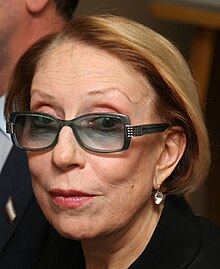Inna Churikova
| Inna Churikova | |
|---|---|

Inna, at a press conference in the Saratov Drama Theater in 2011.
|
|
| Born |
Inna Mikhailovna Churikova 5 October 1943 Belebey, Bashkir ASSR, RSFSR, USSR |
| Occupation | Actress |
| Years active | 1965 - present |
| Spouse(s) | Gleb Panfilov |
Inna Mikhailovna Churikova (Russian: И́нна Миха́йловна Чу́рикова, born 5 October 1943) is a Soviet and Russian film and theatre actress.
Churikova was born in Belebey, Bashkir Autonomous Soviet Socialist Republic, RSFSR, USSR. In the early 1950s Inna moved with her mother to Moscow. Inna was bent on becoming an actress from an early age: as a schoolgirl she studied at the drama studio attached to the Stanislavsky Theatre and later, after a few failures, entered Shchepkin Drama School. She debuted in filming whilst a first-year student, in minor episodic roles. Inna Churikova became famous thanks to the films V ogne broda net (No Path Through Fire) (1968), and especially the triumphal Nachalo (The Debut) (1970) by the then beginning film director and her future husband Gleb Panfilov.
Her other most remarkable works were in the films: Tot samyy Myunkhgauzen (The Very Same Munchhausen) (1979) written by Grigory Gorin and directed by Mark Zakharov, Voenno-polevoy roman (Wartime Romance) (1983) by Pyotr Todorovsky, Rebro Adama (Adam's Rib) (1990) by Vyacheslav Krishtofovich, God sobaki (The Year of a Dog) (1993) by Semyon Aranovich, Plashch Kazanovy (Casanova's Raincoat) (1993) by Aleksandr Galin, Kurochka Ryaba (Ryaba My Chicken) (1994) by Andrei Konchalovsky, and Shirli-Myrli (What a mess!) (1995) by Vladimir Menshov. For her role in Wartime Romance, she won the Silver Bear for Best Actress at the 34th Berlin International Film Festival, and won the Nika Award in 1991 in the Best Actress category for her role in Rebro Adama.
...
Wikipedia
